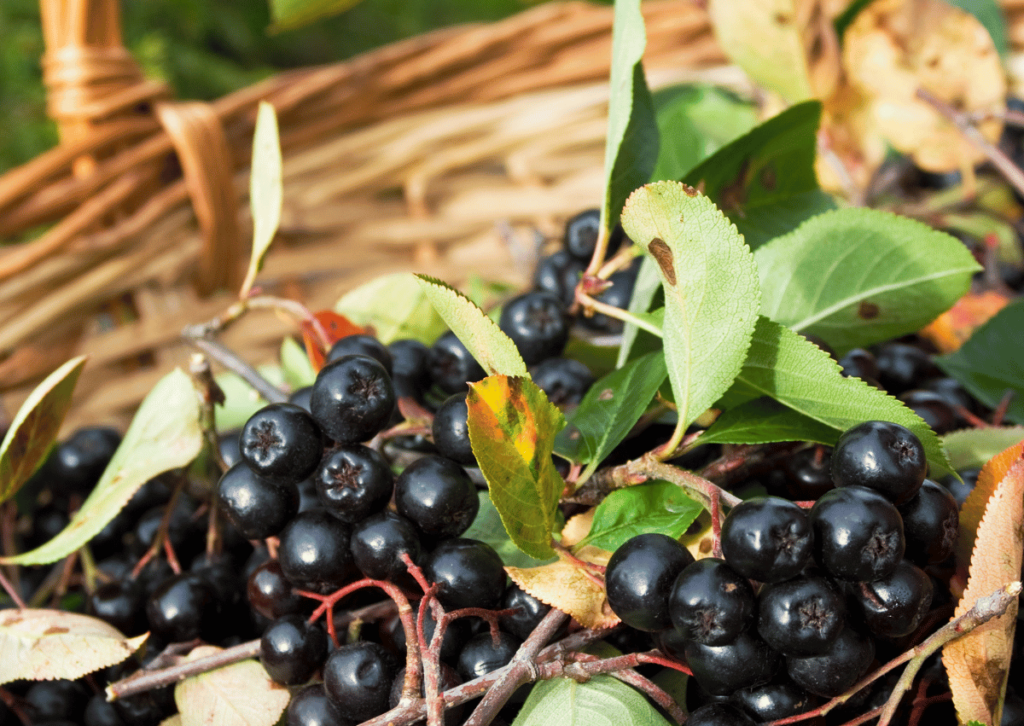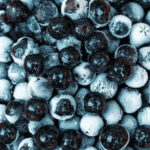Preserving Aronia Berries: A Personal Experience and Scientific Insight

Aronia berries, specifically the Black Aronia (Aronia melanocarpa), are small, dark fruits that have been gaining popularity for their impressive health benefits. Native to North America, these berries are packed with nutrients and antioxidants, including polyphenols and anthocyanins, which are known for their anti-inflammatory and immune-boosting properties. They are also high in fiber, vitamin C, and manganese, making them a great addition to a healthy diet. But the benefits of Black Aronia berries extend beyond their nutritional profile. Their tart, almost bitter taste can add a unique flavor to a variety of dishes, from smoothies and sauces to baked goods and salads.
Why We Freeze Our Black Aronia Berries
One of the primary reasons we freeze our Black Aronia berries is to reduce their astringency (the berries are also known as chokeberries). Freshly picked, these berries have a tart, almost bitter taste that can be off-putting to some. This is due to the high levels of tannins in the berries, which give them their astringent quality. However, when the berries are frozen, a fascinating transformation occurs. The freezing process breaks down the cell walls of the berries, reducing the astringency and making the berries taste sweeter and more palatable. It’s a natural way to enhance the flavor of the berries without adding any additional sweeteners. So, by freezing our Aronia berries, we’re not just preserving them for later use, we’re also improving their taste, making them a more enjoyable addition to our meals and snacks.
My wife and I have been cultivating Black Aronia berries in our backyard here in Norway for several years now. Every year, as the berries ripen, we face the same dilemma: the birds start eyeing them long before the first frost, which is when the berries are at their best. To solve this problem, we started freezing the berries as soon as they ripen. This not only allows us to enjoy the berries at their peak, but also ensures that we have a steady supply throughout the year.

Freezing the berries was a decision born out of necessity, but it turned out to be a blessing in disguise. We quickly discovered that the freezing process actually improved the taste of the berries, making them less tart and more palatable. It was a pleasant surprise and one that made us even more committed to our annual berry-freezing ritual.
This personal experience sparked our curiosity about the impact of freezing on Black Aronia berries, leading us to delve into scientific research on the subject. The findings were fascinating and provided valuable insights into our own practices. But more on that later. For now, let’s delve into some of the common questions people have about freezing Aronia berries.
The Impact of Refrigeration and Frozen Storage on the Quality of Aronia Berries
While our personal experience with freezing Aronia berries has been largely positive, we were curious to understand the scientific implications of this practice. Specifically, we wanted to know how refrigeration and frozen storage impact the quality of these berries. As we’ve mentioned, Aronia berries are rich in beneficial compounds like polyphenols and anthocyanins. But what happens to these compounds when the berries are stored in the fridge or freezer? Does the freezing process that makes the berries taste better also preserve their nutritional quality? Or does it lead to a loss of these valuable nutrients?
To answer these questions, we turned to scientific research. We found a recent study titled “Refrigerated and frozen storage impact aronia berry quality” that provided some fascinating insights. The study explored the effects of refrigeration and freezing on Aronia berries, looking at how these storage methods affect the berries’ polyphenol content and overall quality.
In the following sections, we’ll delve into the findings of this study and discuss their implications for our own berry-freezing practices. We’ll also address some common questions about freezing Aronia berries, providing practical advice based on both our personal experiences and scientific research. So, whether you’re a fellow Aronia berry grower or just someone interested in food preservation, stay tuned for some valuable insights.
Scientific Research on Refrigeration and Frozen Storage of Aronia Berries
The research paper titled “Refrigerated and Frozen Storage Impact Aronia Berry Quality” is a deep dive into how cold storage affects Aronia berries. The study was led by Erica S. King, Andrea Noll, Susan Glenn and Bradley W. Bolling at the University of Wisconsin–Madison and was published in December 2022.
The researchers wanted to know how keeping Aronia berries in the fridge or freezer changes their quality. They looked at things like the berries’ nutrient content, sugar levels, acidity, color, and structure.
Here’s what they found
- Keeping the berries in the fridge for 12 weeks caused some loss of nutrients. The biggest loss was seen in anthocyanins, the compounds that give the berries their dark color, with a 36% decrease.
- Freezing the berries for the first 6 months actually increased the amount of nutrients. But by the 8th month, the nutrient levels went back to what they were before freezing.
- When the berries were frozen and then thawed repeatedly (what the researchers call “temperature cycling”), the amount of anthocyanins decreased by 18%. But the total amount of nutrients didn’t change.
- This temperature cycling also caused some damage to the berries’ cells, which led to the release of more anthocyanins inside the berry.
- The acidity of the berries changed more when they were kept in the fridge than when they were frozen. After 12 weeks in the fridge, the berries became less acidic and slightly more alkaline.
Despite these changes, the researchers concluded that both refrigeration and freezing are good ways to keep Aronia berries without losing too many of their nutrients. In fact, frozen berries can keep their nutrients for up to 8 months.
This research gives us a better understanding of what happens to Aronia berries when they’re stored in the cold. It confirms some of our own experiences and helps us make sure we’re preserving the berries in the best way possible.
Comparing Personal Experiences with Scientific Findings on Freezing Aronia Berries
In comparing our personal experiences with the scientific findings from the research paper, there are several interesting points of convergence and divergence to discuss.
Firstly, our practice of freezing Aronia berries aligns with the study’s findings. We’ve noticed that freezing the berries enhances their taste, making them less tart and more enjoyable. This aligns with the study’s observation that freezing can increase the extractability of polyphenols, the compounds that contribute to the berries’ taste and nutritional value.
Freezing Aronia Berries – A Year-Round Health Boost
The study also found that freezing Aronia berries for up to 8 months does not significantly reduce their overall nutrient content. This is reassuring, as it means that our practice of freezing the berries for use throughout the year is a viable method for preserving their health benefits.
However, the study’s findings about temperature cycling – the process of repeatedly freezing and thawing the berries – are particularly interesting. While we don’t intentionally subject our berries to temperature cycling, it’s possible that this could occur naturally to some extent during storage and use. According to the study, temperature cycling can cause some cell damage in the berries and lead to a decrease in anthocyanins. This is something we’ll need to consider in our storage and usage practices.
In terms of usage, we primarily use our Aronia berries for making lemonade, often mixed with other berries like red currant and gooseberry. We’ve also experimented with using a dehydrator on the frozen berries to create a tasty and nutritious addition to breakfast cereals. While the study didn’t specifically investigate these uses of Aronia berries, its findings about the effects of cold storage on the berries’ quality and nutrient content are still highly relevant. They suggest that whether we’re using them for lemonade or cereal, freezing is a good way to preserve the taste and nutritional value of Aronia berries.
In conclusion, our personal experiences with freezing Aronia berries largely align with the scientific findings. However, the study has also provided us with new insights that will help us further optimize our storage and usage practices. It’s a fascinating example of how science can inform and enhance our everyday practices.
Conclusion
In our journey with Black Aronia berries, we’ve discovered that the freezing process not only helps us preserve these nutritious fruits for year-round use, but also enhances their taste, making them a delightful addition to our meals and beverages. Our personal experiences have been largely validated by scientific research, which shows that freezing Aronia berries can help maintain their nutrient content for up to 8 months.
However, the research also highlights the potential impact of temperature cycling on the berries’ quality, a factor we’ll need to consider in our storage practices. As we continue to enjoy our homegrown Aronia berries in everything from lemonade to breakfast cereal, we’ll also continue to learn and adapt our practices based on both our personal experiences and the latest scientific findings.
In the end, our story with Aronia berries is about more than just preserving a fruit. It’s about the intersection of personal experience and scientific knowledge, and how the two can come together to enhance our understanding and appreciation of the natural world. Whether you’re an Aronia berry grower, a food preservation enthusiast, or simply someone interested in healthy living, we hope our journey inspires you to explore the wonderful possibilities of this remarkable berry.
Common Questions about Freezing Aronia Berries
In this section, we’ll address some of the most frequently asked questions about freezing Aronia berries. These questions often come up in discussions about food preservation and Aronia berry usage, and we hope our answers will provide helpful guidance.
Can you freeze Aronia berries and how long can they be kept frozen?
Yes, you can definitely freeze Aronia berries. In fact, freezing is one of the best ways to preserve Aronia berries for long-term use. According to the research we discussed earlier, Aronia berries can be frozen for up to 8 months without significant loss of nutrients. This means you can enjoy your harvested Aronia berries throughout the year.
How do you freeze Aronia berries?
Freezing Aronia berries is a simple process. First, make sure the berries are ripe and in good condition. Wash them thoroughly and let them dry. Then, spread the berries out on a baking sheet lined with parchment paper, making sure they’re not touching each other. Place the baking sheet in the freezer for a few hours until the berries are fully frozen. Once frozen, you can transfer the berries into freezer-safe bags or containers. Remember to label the bags with the date, so you can keep track of how long they’ve been stored.
How do you freeze dry Aronia berries?
Freeze drying is a bit more complex than regular freezing, as it requires special equipment. If you have a home freeze dryer, you can certainly use it to preserve your Aronia berries. The process involves freezing the berries, then reducing the surrounding pressure and adding heat to allow the frozen water in the berries to sublimate directly from ice to vapor. The result is freeze-dried Aronia berries that retain most of their nutritional value and can be stored for years. If you don’t have a freeze dryer, you might consider using a dehydrator on your frozen berries, as we often do, to create a tasty addition to meals and snacks.
The goal is to preserve the quality and nutritional value, whether you choose to freeze or freeze-dry your Arona berries. The nutritional value should be maintained by either process.
References
In the creation of this article, we’ve drawn upon our personal experiences as well as scientific research. Here are the sources we’ve referenced:
- King, E. S., & Bolling, B. W. (2022). Refrigerated and frozen storage impact aronia berry quality. Food Production, Processing and Nutrition, 4(1), 1-13. Available at: https://www.researchgate.net/publication/358107868_Refrigerated_and_frozen_storage_impact_aronia_berry_quality
These resources provide valuable insights into the impact of refrigeration and freezing on the quality of Aronia berries. We encourage readers interested in this topic to explore these sources for more detailed information.
Discover the Surprising Resilience of Nature
While Aronia berries can sometimes seem too robust, even slightly invasive in our property, it’s important to remember that the world of plants is full of surprises. Some plants that we might initially write off as lost causes can demonstrate remarkable resilience, bouncing back in ways we never expected.
To explore this fascinating aspect of gardening further, check out this article:
The Unexpected Resilience: When Seeds and Plants Surprise Us
It’s a deep dive into the unexpected survival of seeds, the comeback of ‘dead’ plants, and the intriguing journey of grafted trees. You’ll discover that even in the face of adversity, nature finds a way to thrive.
Discover More: Unlock the Health Benefits of Aronia Berries
If you’re interested in preserving Aronia berries, you’ll likely want to know more about the incredible health benefits they offer. From their rich nutritional profile to potential antiviral properties, Aronia berries are a true superfood. Dive deeper into the science and practical applications in our latest article: Exploring the Health Benefits and Antiviral Properties of Aronia Berries.




